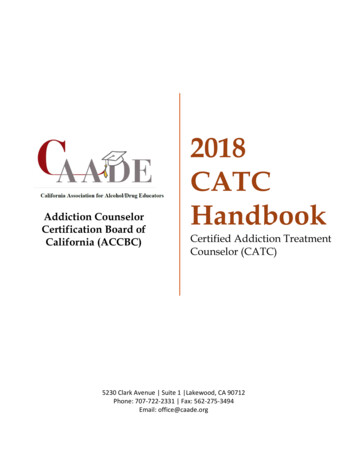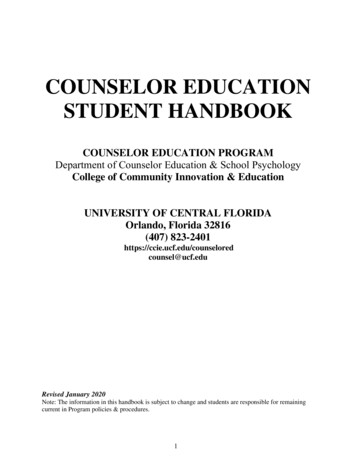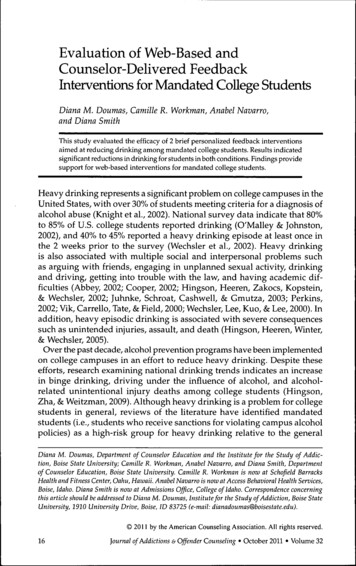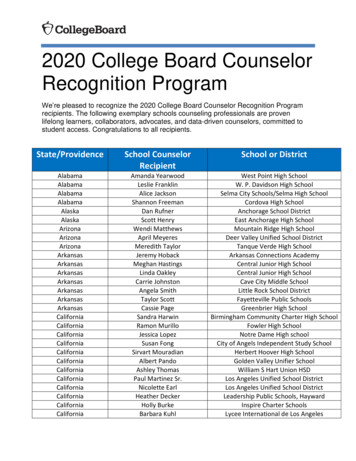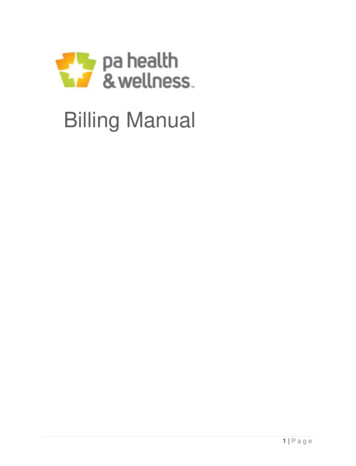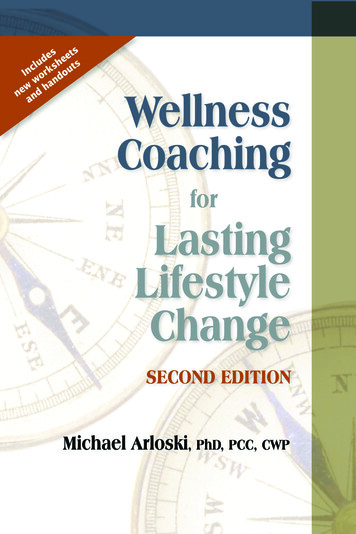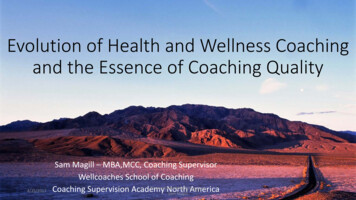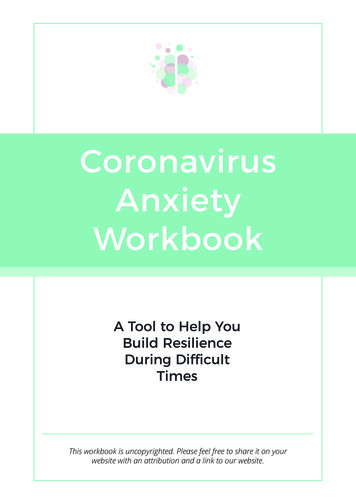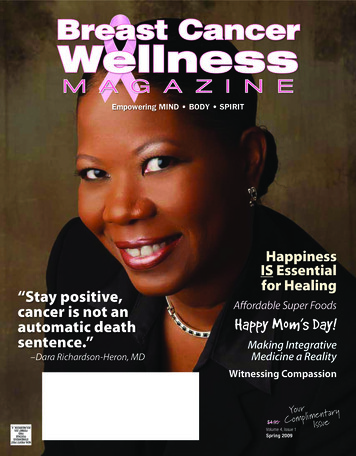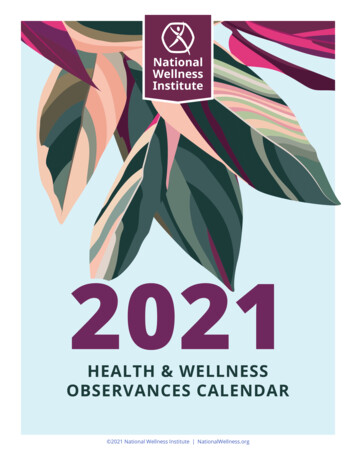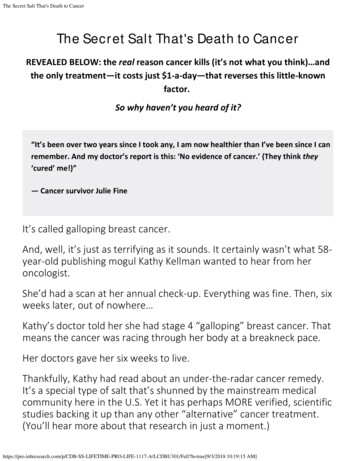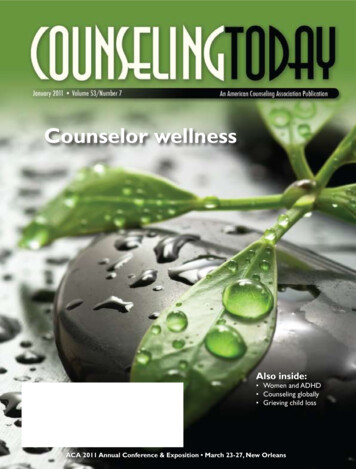
Transcription
Counselor wellnessAlso inside: Women and ADHD Counseling globally Grieving child lossACA 2011 Annual Conference & Exposition March 23-27, New Orleans
FROM ASPIRATION TO REALITY,QLWLDO BCare about others Are eager to promote changeStrive for professional andpersonal achievementQ Q Argosy University, College of Psychology and Behavioral Sciencegraduate degrees are designed for individuals who wish to further theirprofessional development in the fields of mental health, counseling andcommunity services.The Master of Arts in Community Counseling Program prepares you Q to become a skilled and caring counselor able to work with diverseindividuals and groups Q to serve in various community and mental health settingsThe Doctor of Education in Counselor Education and Supervision facilitates your Q becoming a counselor educator who trains and supervises newgenerations of counselorsactualizing your vision of becoming a leader in and gatekeeper of the fieldQ Argosy University, aspire to be.Argosy University Administration205 North Michigan Avenue, Suite 1300 Chicago, IL 60601 G 3'HDGOLQ)LUVW 5X3XEOLFD6HFWLRQ6SHFV T ST ST 5HFor individuals who:Q3URRI 'counseling.argosy.edu1.877.851.9072Degree programs, delivery options, and start dates vary by campus. Argosy University, Washington DC is certified by the State Council of Higher Education to operate in Virginia. Argosy University, Nashville isauthorized by the Tennessee Higher Education Commission. Financial Aid is available to those who qualify. Argosy University is accredited by the Higher Learning Commission and a member of the North CentralAssociation (230 S. LaSalle Street, Suite 7-500, Chicago, IL 60604-1413, 1.800.621.7440, www.ncahlc.org). The Doctor of Psychology in Clinical Psychology Program at Argosy University, Atlanta, Chicago, Hawai’i ,Orange County, Phoenix, Schaumburg, Tampa, Twin Cities and Washington DC is accredited by the Commission on Accreditation of the American Psychological Association (APA) (750 First Street, NE, Washington D.C. 200024242, 1.202.336.5979). The Doctor of Psychology in Clinical Psychology Program at Argosy University, San Francisco Bay Area is “accredited, on probation (appealable)” status with the Commission on Accreditation of theAmerican Psychological Association (APA) (750 First Street, N.E., Washington, D.C. 20002-4242, 1.202.336.5979).
CounselingTodayCover Story30Taking care of yourself as a counselorBy Lynne ShallcrossContentsJanuary 2011Counselors commonly preach the gospel of self-care to clients, but even veteranpractitioners admit they are not always good about heeding their own advice.Features38Underdiagnosed and overwhelmedBy Stacy Notaras Murphy30So strongly is ADHD associated with boys, hyperactivity and obvious distractibilitythat girls with the disorder often grow up misdiagnosed and medicated for other issues.42It’s a small worldBy Lynne ShallcrossACA members demonstrate their passion for thinking and acting globally.48Reader ViewpointGrieving the ultimate griefBy Steve Bain38A counselor shares tips for running a grief group for parents who have lost a child.50Reader ViewpointCoping with the death of a childBy Mike Hovancsek42A therapist who specializes in grief confronts the aftermath of his own personal tragedy.5254Special Series: DSM-5Major changes to substance-related disordersBy K. Dayle JonesVISTAS provides invaluable perspectiveBy Garry R. Walz and Jeanne C. BleuerACA’s online database is a rapidly expanding, ever-evolving resource for counselors.Extras56Guide to 2010 feature articles & special itemsJanuary 2011 Counseling Today 3
CounselingTodayJanuary 2011101216202428Washington UpdateCounselor Career StoriesNew PerspectivesPrivate Practice in CounselingResource ReviewsThe Digital PsywayNeed to Know57857626466NumbersNumbersby theColumnsFrom the PresidentExecutive Director’s MessageLetters to the EditorACA Foundation MessageDivision, Region & Branch NewsBulletin BoardClassifiedsMental healthin AmericaOne in five Americans experienced some formof mental illness in 2009, according to a newgovernment study, and 11 million individuals wereafflicted with a serious mental illness. Researchers from theSubstance Abuse and Mental Health Services Administrationfound a 19.5 percent increase in the rate of mental illnessin 2009 compared with figures from 2008, partially due toan uptick in depression, particularly among those who wereunemployed.Among the study’s other findings:u Only 37.9 percent of those with a mental illness in thepast year had received mental health services.uuuuu4 Counseling Today January 201123.8 percent of women experienced some form of mentalillness, compared with 15.6 percent of men.Mental illness was highest among young adults ages 18to 25 (30 percent) and lowest among those 50 and older(13.7 percent).Nearly 20 percent of adults with mental illness also had asubstance use disorder.27.7 percent of unemployed adults had experiencedmental illness, compared with 17.1 percent of those whowere employed full time.8.4 million adults had serious thoughts of suicide.
Marcheta EvansFrom The PresidentWCounselingTodayHow well is yourwheel rolling?hat is a resolution? When youthink about it, what does itreally mean to you? As we beginanother new year, I have been reflecting onthe many resolutions I have made in pastyears. They have centered on my physical,mental and spiritual health, my family, howI viewed my job, my leadership role and onand on. The list can seem immeasurable, yetI find myself once again looking at what isahead of me and contemplating what goalsI would like to accomplish for 2011. I mustadmit, they all seem to have a familiar ring tothem from previous years. What about thisyear will be different from past years? Will Ibe more successful with some of my healthgoals? Will I get up every morning, work outand make time for my meditation? I am sureyou are asking yourself similar questions asyou think about the year ahead.The cover story in this issue of Counseling Today focuses on how we take care ofourselves as professional counselors. Thefirst thought that came to my mind was, dowe take care of ourselves? So many times wefind ourselves taking care of the needs andproblems of others. Do we heed our ownadvice and take care of ourselves? I know youare aware of the importance of taking careof yourself. After all, this is what we tell ourclients and our students to do. But do youhonestly make this a priority as you go aboutyour daily life?Rarely do people come to see us becausetheir lives are filled with an enormousamount of joy and bliss. Typically, they arecoming to us because they need support fora problem or an issue in their life. When youconsistently expend energy assisting studentsor clients in resolving their issues, you mustfind a way to replenish yourself. As a counselor educator, I constantly tell my students theyare the most important tool they are takinginto the counseling relationship. If they arenot functioning at full capacity, it will have adirect impact on the quality of services theyoffer their students or clients.Over the years, the Wheel of Wellness, developed by Melvin Witmer, Thomas Sweeneyand Jane Myers in 1998, has continued toimpress me as a model not only for our clientsand students, but also for us as professionalcounselors. I know the authors have continued to evolve their model, but the versionthat resonates with me most personally is theone that places spirituality at the center of thewheel, with the spokes representing self-care,stress management, gender identity, culturalidentity and sense of worth. Also included aresense of control, realistic beliefs, emotionalawareness and coping, problem solving andcreativity, sense of humor, nutrition andexercise. If you were to take a personal inventory of your life right now, how well roundedwould your wheel be? If you look at the elementary concept of a wheel, you know thatit must be balanced all the way around for itto roll effectively. How do you see your wheelrolling? All of the areas must receive adequateattention for you to be properly nourishedand effective in your job.Upon investigating further, I discoveredthese authors defined wellness in a 2000Journal of Counseling & Development articleas a “way of life oriented toward optimalhealth and well-being in which body, mindand spirit are integrated by the individual tolive more fully within the human and natural community.” This may seem a little tootouchy-feely for some, but when I ponder thelife and well-being of professional counselors,this definition is congruent with my philosophy of living. Whether you agree or not, Iencourage you to consider how well you aretaking care of yourself. If you find you arelacking in any area, I urge you to do whateverit takes to make a change. If you have foundthat resolutions work for you, go for it. If not,find a model that is effective for you.I attended a seminar once where the presenter gave me a “tuit.” I looked at it andwondered, “What is this?” After a brief explanation, the presenter informed us that wenow possessed “a round tuit,” which basicallymeant there were no further excuses for notgetting things done. You don’t have to waituntil you get around to it. I am giving you “around tuit” to focus on yourself right now! uCounseling Today StaffPublisherRichard YepAssociate PublisherCarol NeimanEditor-in-ChiefJonathan Rollins800.347.6647 ext. 339jrollins@counseling.orgSenior WriterLynne Shallcross800.347.6647 ext. 320lshallcross@counseling.orgAdvertising RepresentativeKathy Maguire607.662.4451kmaguire@counseling.orgGraphic DesignerCarlos J. Soto II800.347.6647 ext. 377csoto@counseling.orgCT Column EditorsWashington UpdateScott Barstow800.347.6647 ext. 234sbarstow@counseling.orgCounselor Career StoriesRebecca Daniel-Burke800.347.6647 ext. 230RDanielBurke@counseling.orgResource ReviewsKelly DuncanKelly.Duncan@usd.eduPrivate Practice in CounselingRobert J. Walsh and Norman C. Dasenbrookwalshgasp@aol.comSpotlight on JournalsSheri Baumansherib@u.arizona.eduNew PerspectivesDonjanea L. Fletcherdfletche@westga.eduThe Digital PsywayMarty Jenciusmjencius@kent.eduJanuary 2011 Counseling Today 5
Learn the LatestTheory and TechniquesWith These New Texts From ACA!Clinical Supervision in the HelpingProfessions: A Practical Guide,Second EditionGerald Corey, Robert Haynes, PatriceMoulton, Michelle MuratoriThis straightforward guide emphasizeseffective skill development for supervisionin a variety of settings. Topics coveredinclude the roles and responsibilities ofsupervisors, the supervisory relationship,models and methods of supervision,becoming a multiculturally competentsupervisor, ethical and legal issues insupervision, managing crisis situations, and evaluation insupervision. User-friendly tips, case examples, sample forms,questions for reflection, and group activities are includedthroughout the text, as are contributing supervisors’ VoicesFrom the Field and the authors’ Personal Perspectives—makingthis an interactive learning tool that is sure to keep readers ÌiÀiÃÌi Ê Ê Û Ûi ÊÊÓä äÊUÊÎä{Ê«}Ã"À iÀÊ ÇÓn nÊ - Ê Çn xxÈÓä ÎäÎ ÊÊList Price: 62.95ACA Member Price: 43.95The Professional Counselor: Portfolio,Competencies, Performance Guidelines,and Assessment, Fourth EditionDennis W. Engels, Casey A. Barrio Minton, Dee C. Ray,and AssociatesStudent learner outcomes andcounselor work behaviors are tied tothe 2009 CACREP Standards in thishandbook for students, educators,supervisors, researchers, and practitioners seeking to update, refresh, orevaluate their knowledge of and skillsin the most important competenciesin counseling. Ideal for use as a student portfolio or a supplementary text, this edition continues ÊÎx Þi ÀÊÌÀ Ì Ê vÊ«À Û }Ê ÊÕÃivÕ ÊvÀ iÜ À Êv ÀÊÌÀ V }Ê Û Õ Ê«À viÃà Ê}À ÜÌ Ê ÊiÛ Õ Ì ÊÓä äÊUÊÓ{{Ê«}Ã"À iÀÊ ÇÓn ÇÊ - Ê Çn xxÈÓä Ó È { ÃÌÊ*À Vi\Êf{ xÊ ACA Member Price: 33.95AMERICAN COUNSELINGASSOCIATION 800-422-2648 x222Counseling.org6 Counseling Today January 2011The ACA Encyclopedia of CounselingThis premiere counseling referencebook is perfect for educators, students,supervisors, researchers, and practitioners looking to enhance their knowledgeof the most important topics in counÃi } Ê ÀiÊÌ Ê{ääÊi ÌÀ iÃÊë ÊÌ iÊ2009 CACREP core areas making thisa wonderful text for introductory counseling classes or for use as a study guide when preparing for the Ì Ê Õ Ãi ÀÊ Ý ÊÓää ÊUÊÈÇÓÊ«}ÃOrder #72879ISBN 978-1-55620-288-9List Price: 99.95ACA Member Price: 74.95Career Counseling: Contexts, Processes, and Techniques, Third EditionNorman C. Gysbers, Mary J. Heppner, and Joseph A. JohnstonCareer Counseling incorporates themost widely used career counselingpractices with new and emerging careerdevelopment concepts, making it anexceptional text for both counselorsin-training and seasoned practitioners.Topics discussed include traditionaland postmodern career theories andapproaches; counseling an increasingly diverse workforce; forming aproductive alliance with the client; using assessment inventories and instruments; and developing client action plans.Óää ÊUÊÎÓxÊ«}ÃOrder #72881ISBN 978-1-55620-289-6 ÃÌÊ*À Vi\ÊfÈ{ xÊ ACA Member Price: 45.95A Contemporary Approach toSubstance Abuse and AddictionsCounseling: A Counselor’s Guide toApplication and UnderstandingFord Brooks and Bill McHenryThis book provides a basic understanding of the nature of substance abuse andaddiction, its progression, and clinical interventions for college/university,school, and community/mental healthagency settings. Topics covered includedrug classifications; assessment; workingwith ethnically diverse clients, the GLBTpopulation, and women; the continuumof nonuse to addiction; developmentalapproaches in treating addiction; relapseprevention; grief and loss in addiction; group counseling;working with families; spirituality; addictions training andiÌ V Ê ÃÃÕiÃÆÊ ÊV Õ Ãi ÀÊÃi v V Ài ÊÓää ÊUÊÓnäÊ«}ÃOrder #72888ISBN 978-1-55620-282-7 ÃÌÊ*À Vi\Êf{È xÊ ACA Member Price: 33.95
CounselingTodayRichard YepExecutive Director's message“GThe amazingprofession thatkeeps on givingiving back to the community”is much more than acatchphrase within ACA. As Ilook back through the years, I am amazedat the volunteerism and generosity of ACAmembers. Your strong desire to lend ahand to those in need — wherever theymay be — is exemplary. In fact, it is trulyone of the reasons that I enjoy my job asyour executive director.This past year at the ACA Conference &Exposition in Pittsburgh, the Associationfor Multicultural Counseling andDevelopment, an ACA division, organizeda very successful community serviceday that provided counseling services toPittsburgh’s diverse communities. AMCDlaunched this service day concept at the2009 ACA Conference in Charlotte,N.C., where it reached out to local at-riskadolescents to address issues such as anger,gangs and low self-esteem.Also in Charlotte, Counselors forSocial Justice, another ACA division,donated 1,000 to Pat’s Place Children’sAdvocacy Center, an organizationthat connects children who have beensexually abused to area resources. And yetanother ACA division, the CounselingAssociation for Humanistic Educationand Development, which has sponsoredthe Empty Plate Project for many years,collected donations for A Children’s Place,a Charlotte charity that provides supportto homeless children.In addition to these incredible acts ofkindness in support of our host cities,conference attendees have developedspecial programs to address multiculturaland social justice leadership competenciesthat contribute to exemplary practice indealing with the many injustices that existin our world.In March, ACA returns to NewOrleans, a city that has surely experiencedits share of agony, grief, injustice andincredible loss. Once again, ACA willreach out to the local population to lendits services wherever they are needed— at homeless shelters, in communitycleanup and revitalization projects, atsocial service agencies and in schoolrecovery efforts. The experience will notend after we complete our outreach to thecommunity, however. When conferenceattendees return to the Ernest N. MorialConvention Center, they will be invitedto participate in afternoon workshops ontopics of economic and social injustice,marginalized populations and otherissues that impact those of you whohave dedicated your lives to the helpingprofessions.If you are attending the ACAConference, I encourage you to joinyour colleagues for the 2011 ACA NewOrleans Project: Giving Back to theCommunity. All conference attendees areinvited! Details had yet to be finalized atpress time, but the community outreachwill occur the morning of Thursday,March 24, and the program portion willtake place that afternoon.ACA members have much to offercommunities, whether during the ACAConference or at other times. Membersvolunteered their time offering disastermental health services after HurricanesKatrina and Rita and have been involvedin other more recent disaster reliefefforts as well. For example, withindays of the tragic earthquake in Haiti,ACA developed and posted a 48-minutepodcast to help Haitian Americans copewith the disaster that was unfoldingin their homeland, set up donationprograms through the ACA Foundationand consulted with the Red Cross.Speaking of disaster mental health, here’sanother sign that volunteerism is surgingthrough the ACA membership. TheAmerican CounselingAssociationPresidentMarcheta Evans800.347.6647 ext. 232marcheta.evans@utsa.eduPresident-ElectDon W. Locke800.347.6647locke@mc.eduExecutive DirectorRichard Yep800.347.6647 ext. 231ryep@counseling.orgCounseling Today (ISSN 1078-8719) is themonthly magazine of the American CounselingAssociation, 5999 Stevenson Ave., Alexandria,VA 22304-3300; Telephone: 703.823.9800;Internet: counseling.org. Opinions expressedin this magazine do not necessarily representopinions of the editors or policies of theAmerican Counseling Association.Subscriptions are available for 150 for 12issues by calling PP&F at 800.633.4931. Singlecopies are available for 12.50 each by callingACA in-house fulfillment at 800.422.2648 ext.222.Periodicals postage paid at Alexandria, Va., andadditional mailing offices. Postmaster: Sendaddress changes to ACA Member Services,5999 Stevenson Ave., Alexandria, VA 22304.All rights reserved, 2011 by the AmericanCounseling Association.Editorial PoliciesCounseling Today reviews unsolicited articlesand guest editorials for possible publication.Not all articles will be accepted for publication.Send articles or request a copy of the writingguidelines by e-mailing ct@counseling.org.Anti-Discrimination PolicyThere shall be no discrimination against anyindividual on the basis of ethnic group, race,religion, gender, sexual orientation, age and/ordisability.Mission StatementThe mission of the American CounselingAssociation is to enhance the quality of lifein society by promoting the developmentof professional counselors, advancing thecounseling profession and using the professionand practice of counseling to promote respectfor human dignity and diversity.Continued on page 8January 2011 Counseling Today 7
LettersAdvocacy efforts opendoors to counselorsThe Washington Update article titled“Veterans Affairs establishes new counselorposition standards” (November 2010) gaveme a clear notion of hope as a first-yearmaster’s counseling student. From the timewe attend orientation, we are encouragedto explore the field of counseling and assured that the possibilities are endless.Some of us come into the program knowing the population, theory or setting forwhich we have a passion. Others of us floatalong, hoping that at some point in ourperiod of course work we, too, will find apassion.I was fortunate enough to find mypassion in regard to counseling and itsconnection to the military. As both acounseling student and the friend andacquaintance of many
Argosy University, Washington DC is certified by the State Council of Higher Education to operate in Virginia. Argosy University, Nashville is authorized by the Tennessee Higher Education Commission. Financial Aid is available to those who qualify. Argosy University is accredited by the Hig
